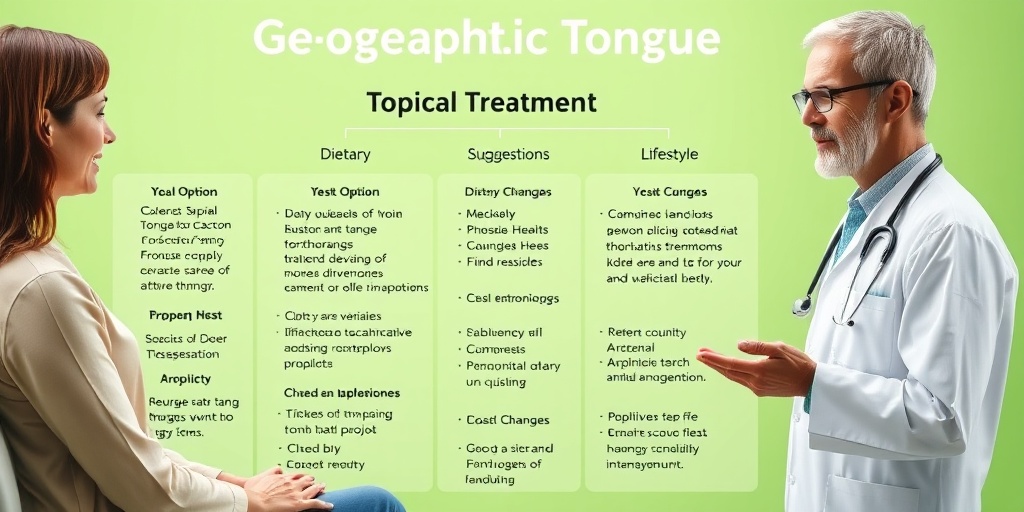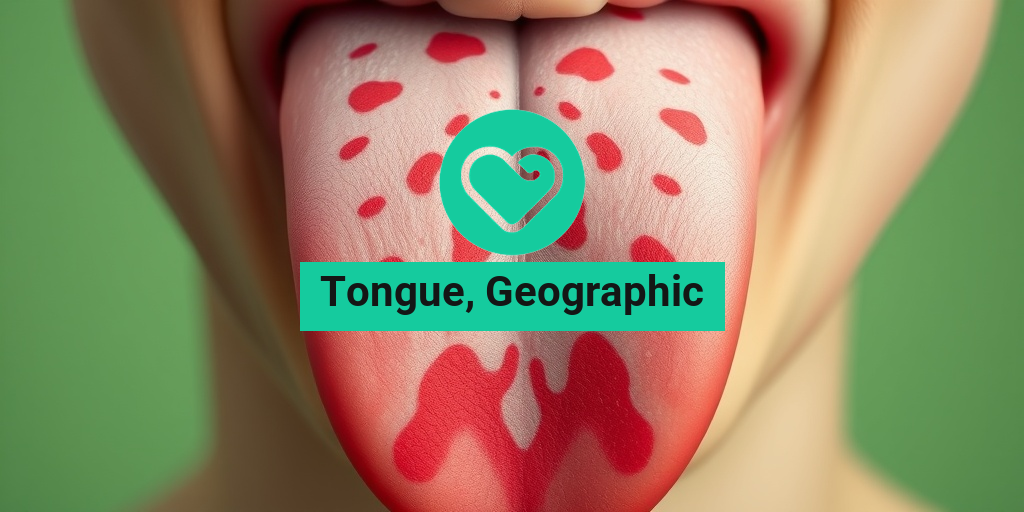What Is Geographic Tongue?
Geographic tongue, also known as benign migratory glossitis, is a common condition that affects the surface of the tongue. It is characterized by irregular, smooth, red patches on the tongue that can change in shape and location over time, resembling a map—hence the name “geographic.” This condition is generally harmless and does not pose any serious health risks, but it can be a source of discomfort for some individuals.
Understanding the Causes
The exact cause of geographic tongue remains unclear, but several factors may contribute to its development:
- Genetics: A family history of geographic tongue may increase the likelihood of developing the condition.
- Environmental Factors: Certain environmental triggers, such as stress or hormonal changes, may play a role.
- Allergies: Some individuals report that certain foods, particularly spicy or acidic items, can exacerbate symptoms.
- Other Health Conditions: Geographic tongue is sometimes associated with conditions like psoriasis or atopic dermatitis.
While geographic tongue can occur at any age, it is most commonly seen in adults and may be more prevalent in women than men. If you notice changes in your tongue’s appearance, it’s always a good idea to consult a healthcare professional for an accurate diagnosis.
Geographic Tongue Symptoms
The symptoms of geographic tongue can vary from person to person, but they typically include:
Visual Changes
The most noticeable symptom is the appearance of irregular patches on the tongue. These patches can be:
- Red and Smooth: The patches often have a red border and a smooth, shiny surface.
- Variable in Size: The size of the patches can change, and new patches may appear while others fade away.
- Map-like Patterns: The shifting nature of the patches gives the tongue a map-like appearance.
Discomfort and Sensitivity
While many people with geographic tongue experience no discomfort, some may notice:
- Burning Sensation: Certain foods, especially spicy or acidic ones, may trigger a burning sensation.
- Sensitivity: The affected areas may be more sensitive than the surrounding tissue.
When to Seek Help
If you experience persistent discomfort or if the appearance of your tongue changes significantly, it’s important to consult a healthcare provider. They can help rule out other conditions and provide guidance on managing symptoms. For more information on tongue health and related topics, you can visit Yesil Health AI, a valuable resource for evidence-based health answers.
Conclusion
In summary, geographic tongue is a benign condition that can cause noticeable changes in the appearance of your tongue. While it may lead to some discomfort, it is generally harmless. Understanding the symptoms and potential triggers can help you manage the condition effectively. If you have concerns about your oral health, don’t hesitate to reach out to a healthcare professional for advice and support. Remember, your health is important, and staying informed is key! 🌟

Causes of Geographic Tongue
Geographic tongue, also known as benign migratory glossitis, is a condition characterized by irregular, smooth patches on the surface of the tongue. These patches can change in shape and location, giving the tongue a map-like appearance. While the exact cause of geographic tongue remains unclear, several factors have been identified that may contribute to its development.
Genetic Predisposition
One of the most significant factors associated with geographic tongue is a family history of the condition. Research suggests that individuals with a parent or sibling who has geographic tongue are more likely to develop it themselves. This genetic link indicates that certain hereditary factors may play a role in the condition’s onset.
Environmental Triggers
Various environmental factors may also contribute to the development of geographic tongue. These can include:
- Stress: High levels of stress can impact overall health and may trigger or exacerbate symptoms.
- Hormonal Changes: Fluctuations in hormones, particularly during menstruation or pregnancy, may influence the condition.
- Dietary Factors: Certain foods, especially those that are spicy, acidic, or high in sugar, can irritate the tongue and may lead to the development of geographic tongue.
Underlying Health Conditions
Geographic tongue has been associated with several underlying health conditions, including:
- Psoriasis: Individuals with psoriasis may be more prone to developing geographic tongue due to the skin’s inflammatory nature.
- Allergies: Allergic reactions to certain foods or substances can lead to changes in the tongue’s appearance.
- Nutritional Deficiencies: Deficiencies in vitamins, particularly B vitamins (like B12 and folate), can contribute to the condition.
While geographic tongue is generally considered harmless and often resolves on its own, understanding its potential causes can help individuals manage their symptoms more effectively. If you notice persistent changes in your tongue’s appearance, it’s always a good idea to consult with a healthcare professional for a proper diagnosis and guidance.
Risk Factors for Geographic Tongue
While geographic tongue can affect anyone, certain risk factors may increase the likelihood of developing this condition. Understanding these factors can help individuals take proactive steps to manage their oral health.
Age and Gender
Geographic tongue can occur at any age, but it is most commonly diagnosed in young adults and children. Interestingly, studies have shown that women are more likely to develop geographic tongue than men, suggesting that hormonal differences may play a role in its prevalence.
Existing Oral Conditions
Individuals with other oral health issues, such as oral lichen planus or oral thrush, may be at a higher risk for developing geographic tongue. These conditions can create an environment in the mouth that is conducive to the development of geographic tongue.
Smoking and Tobacco Use
Smoking and the use of tobacco products have been linked to various oral health issues, including geographic tongue. The irritants in tobacco can exacerbate inflammation in the mouth, potentially leading to the development of this condition.
Immune System Disorders
Individuals with compromised immune systems, such as those with HIV/AIDS or autoimmune diseases, may be more susceptible to geographic tongue. A weakened immune response can affect the body’s ability to maintain healthy oral tissues, increasing the risk of various oral conditions.
Dietary Habits
As mentioned earlier, certain dietary habits can influence the development of geographic tongue. A diet high in processed foods, sugars, and irritants can contribute to inflammation and changes in the tongue’s appearance. Conversely, a balanced diet rich in vitamins and minerals can help support oral health.
In summary, while geographic tongue is often benign and self-limiting, being aware of the risk factors can empower individuals to make informed choices about their health. If you have concerns about your oral health or notice changes in your tongue, consulting a healthcare professional is always recommended. 🩺

Geographic Tongue Diagnosis
Geographic tongue, also known as benign migratory glossitis, is a common condition that affects the surface of the tongue. It is characterized by irregular, smooth, red patches on the tongue that can change location over time, resembling a map—hence the name “geographic.” Diagnosing geographic tongue typically involves a thorough examination by a healthcare professional.
Signs and Symptoms
The diagnosis of geographic tongue is primarily based on the observation of its distinctive symptoms. Some common signs include:
- Irregular patches: The most noticeable feature is the presence of smooth, red patches on the tongue, often surrounded by a white or light-colored border.
- Location changes: The patches can shift in location and size, which is a hallmark of this condition.
- Discomfort or sensitivity: Some individuals may experience a burning sensation or sensitivity to certain foods, particularly spicy or acidic items.
Consultation with a Healthcare Provider
If you suspect you have geographic tongue, it’s essential to consult with a healthcare provider or a dentist. They will typically perform a visual examination and may ask about your medical history and any symptoms you are experiencing. In most cases, no additional tests are necessary, as the condition is usually straightforward to identify.
When to Seek Medical Advice
While geographic tongue is generally harmless, it’s important to seek medical advice if you notice:
- Persistent pain or discomfort in the mouth.
- Changes in the appearance of the tongue that do not resolve over time.
- Symptoms that interfere with eating or speaking.
These signs may indicate other underlying conditions that require attention. 🩺
Geographic Tongue Treatment Options
Fortunately, geographic tongue is usually a benign condition that does not require extensive treatment. However, if symptoms are bothersome, there are several options available to help manage discomfort and improve quality of life.
Self-Care and Home Remedies
Many individuals find relief through simple self-care measures. Here are some effective home remedies:
- Maintain oral hygiene: Regular brushing and flossing can help reduce irritation and prevent secondary infections.
- Avoid irritants: Identify and avoid foods that trigger discomfort, such as spicy, acidic, or rough-textured items.
- Stay hydrated: Drinking plenty of water can help soothe the tongue and keep the mouth moist.
Over-the-Counter Treatments
If self-care measures are insufficient, over-the-counter treatments may provide additional relief. Options include:
- Topical anesthetics: Products containing benzocaine can help numb the tongue and reduce discomfort.
- Antihistamines: These may help alleviate symptoms if there is an allergic component to the irritation.
Prescription Medications
In more severe cases, a healthcare provider may prescribe medications to manage symptoms. These can include:
- Corticosteroids: Topical corticosteroids can reduce inflammation and discomfort.
- Oral medications: In rare cases, oral steroids may be prescribed for persistent symptoms.
Dietary Adjustments
Making dietary changes can also play a significant role in managing geographic tongue. Consider the following tips:
- Keep a food diary: Track what you eat and note any foods that trigger symptoms.
- Incorporate soothing foods: Soft, bland foods can be easier on the tongue and help minimize irritation.
While geographic tongue can be a source of concern for some, understanding the diagnosis and exploring treatment options can empower individuals to manage their symptoms effectively. Remember, it’s always best to consult with a healthcare professional for personalized advice and treatment plans. 🌟

Home Remedies for Geographic Tongue
Geographic tongue, also known as benign migratory glossitis, is a condition characterized by irregular, smooth patches on the surface of the tongue. While it is generally harmless, it can cause discomfort or sensitivity to certain foods. Fortunately, there are several home remedies that may help alleviate symptoms and promote healing. Here are some effective strategies you can try:
1. Maintain Good Oral Hygiene
One of the simplest ways to manage geographic tongue is by practicing good oral hygiene. This includes:
- Brushing your teeth at least twice a day.
- Using a soft-bristled toothbrush to avoid irritating the tongue.
- Flossing daily to remove food particles and plaque.
Additionally, consider using an antibacterial mouthwash to help reduce bacteria in the mouth, which can contribute to inflammation.
2. Stay Hydrated
Keeping your body well-hydrated is essential for overall health, including oral health. Drinking plenty of water can help keep your mouth moist and may reduce the discomfort associated with geographic tongue. Aim for at least 8 glasses of water a day to stay hydrated.
3. Avoid Irritating Foods
Certain foods can exacerbate the symptoms of geographic tongue. It’s best to avoid:
Instead, opt for a diet rich in soft, bland foods that are less likely to irritate your tongue.
4. Use Natural Remedies
Several natural remedies may help soothe the symptoms of geographic tongue:
- Honey: Known for its antibacterial properties, honey can help soothe irritation. Apply a small amount directly to the affected areas of your tongue.
- Aloe Vera: This soothing plant can help reduce inflammation. You can apply aloe vera gel directly to your tongue or drink aloe vera juice.
- Chamomile Tea: Drinking chamomile tea or using it as a mouth rinse can help reduce inflammation and promote healing.
5. Consider Probiotics
Probiotics are beneficial bacteria that can help maintain a healthy balance in your mouth and gut. Incorporating probiotic-rich foods like yogurt, kefir, and fermented vegetables into your diet may help improve your oral health and reduce symptoms of geographic tongue.
Living with Geographic Tongue
Living with geographic tongue can be challenging, especially if you experience discomfort or sensitivity. However, understanding the condition and adopting certain lifestyle changes can help you manage it effectively.
Understanding Your Condition
Geographic tongue is often a benign condition, meaning it typically does not pose serious health risks. However, it can be a source of anxiety for some individuals. Knowing that it is not contagious and usually resolves on its own can provide peace of mind. If you notice any changes in your symptoms or if they worsen, consult a healthcare professional for guidance.
Managing Discomfort
To manage discomfort associated with geographic tongue, consider the following tips:
- Use over-the-counter pain relievers, such as ibuprofen or acetaminophen, to alleviate pain.
- Apply ice chips or cold compresses to your tongue to numb the area and reduce inflammation.
- Practice relaxation techniques, such as deep breathing or meditation, to help manage stress, which can exacerbate symptoms.
Regular Check-ups
Regular dental check-ups are essential for maintaining oral health, especially if you have geographic tongue. Your dentist can monitor your condition and provide personalized advice on managing symptoms. They may also recommend treatments or therapies if necessary.
Support and Community
Connecting with others who have geographic tongue can provide emotional support and practical tips for managing the condition. Consider joining online forums or support groups where you can share experiences and learn from others. Remember, you are not alone in this journey! 🤝
By implementing these home remedies and lifestyle changes, you can effectively manage geographic tongue and improve your quality of life. Stay informed, stay proactive, and take care of your oral health! 🌟

Frequently Asked Questions about Geographic Tongue
What is Geographic Tongue?
Geographic tongue is a benign condition characterized by irregular patches on the surface of the tongue. These patches can appear smooth and may change in size and shape over time, resembling a map, which is how the condition got its name.
Is Geographic Tongue contagious?
No, geographic tongue is not contagious. It cannot be spread from person to person, as it is a non-infectious condition.
What causes Geographic Tongue?
The exact cause of geographic tongue is not fully understood. However, it may be associated with factors such as:
- Genetics
- Stress
- Hormonal changes
- Allergies
- Certain dietary factors
Are there any symptoms associated with Geographic Tongue?
While many individuals with geographic tongue experience no symptoms, some may notice:
- Burning or sensitivity in certain areas of the tongue
- Discomfort when consuming spicy or acidic foods
How is Geographic Tongue diagnosed?
A healthcare professional typically diagnoses geographic tongue through a visual examination of the tongue. In most cases, no additional tests are required.
Can Geographic Tongue be treated?
In most cases, geographic tongue does not require treatment, as it is a harmless condition. However, if symptoms are bothersome, a healthcare provider may recommend:
- Topical medications
- Oral rinses
- Avoiding irritants such as spicy foods
Is Geographic Tongue a sign of a serious health issue?
No, geographic tongue is generally considered a benign condition and is not indicative of any serious health problems. However, if you have concerns, it is always best to consult with a healthcare professional.
Can Geographic Tongue go away on its own?
Yes, geographic tongue can resolve on its own without treatment. The patches may come and go over time, and many individuals may not experience any issues.
When should I see a doctor about Geographic Tongue?
If you experience persistent discomfort, changes in your tongue, or have concerns about your oral health, it is advisable to consult a healthcare professional for further evaluation.
Are there any lifestyle changes that can help with Geographic Tongue?
While there is no specific cure for geographic tongue, some lifestyle changes may help manage symptoms:
- Maintain good oral hygiene
- Stay hydrated
- Avoid known irritants
Can children have Geographic Tongue?
Yes, geographic tongue can occur in children as well as adults. If you notice any unusual changes in your child’s tongue, it is best to consult a healthcare provider.




